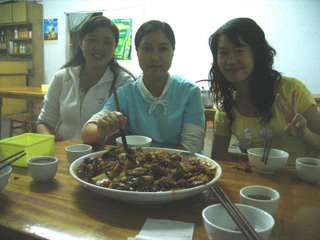 There are two campuses to CWNU. The old campus, located right in downtown Nanchong, is where the science classes and all of the department offices are. The new campus, which is on the outskirts of town about 25 minutes by bus, is where the foreign language, mathematics, post graduate students, and one American English teacher live. (This picture is of the first foreign language building. There are two nearly identical ones towards the left of this one).
There are two campuses to CWNU. The old campus, located right in downtown Nanchong, is where the science classes and all of the department offices are. The new campus, which is on the outskirts of town about 25 minutes by bus, is where the foreign language, mathematics, post graduate students, and one American English teacher live. (This picture is of the first foreign language building. There are two nearly identical ones towards the left of this one). The new campus is still under heavy construction. Most of the buildings are completed, but the finishing touches are still being put on. Trees are being planted, streets are being paved, and plaques that I can’t read are being put in place. The construction never really seems to stop either. Behind my apartment complex, the school is building new teacher's apartments when the new campus is opened to the rest of the faculty. During the week, there are cranes and jackhammers until about 1:00 in the morning. The crews start work at around 7:00. The workers live in little makeshift huts next to the construction site. When they're not working, the construction workers dress surprisingly formally. Most workers wear grey but stylish blazers and coats, collared shirts, and slacks.
The classrooms here are fairly basic, but clean and have good acoustics. The rooms are set up with rows of three seats on the left, five seats in the middle and another row of three seats on the right side. I have access to a computer lab for my Advanced Oral English classes, though I find having computers can sometimes be a distraction. In the computer lab, there are two rows of four connected desks each containing a computer monitor, keyboard, and mouse. Chinese students have this tendency to look down and away from you when a question is asked to the class, especially if they don't know the answer. Adding a computer screen only gives the students another reason not to look up at me. In the front of the classroom is a teacher's computer where I can control what is put up on the screens of the other computers in the class. Unless I absolutely need to show something relevant, I will use one of the regular classrooms because the desks in the computer classroom are small and it's more difficult to split students into gro ups.
ups.
Some of the department offices will be moved to the new campus next year, as well as some of the teachers’ residences. (In the picture: a new science building on the right not yet in use and some construction). It’s nice being the token foreigner on the new campus though.
I feel that hospitality like that is a real crap shoot. There are a few reactions that a foreigner can expect here. I think the most common are shyness, bewilderment, fear, and just plain apathy. I try to make as much communication as I can without seeming overly aggressive. If I can tell someone is talking about me I acknowledge them with a smile and a “Ni hao”. No one expects a foreigner can speak Zhongwen, so I think most Chinese are reluctant to approach a foreigner especially if they can’t speak any English.
At the English corner yesterday, the topic was sports. It officially begins at 8:00, but I have class until 8:30 so I got there half an hour late. Like last time, I took one step outside and immediately a crowd of Chinese freshmen immediately circled around me. It reminded me of the ponds here with the millions of enormous goldfish that swarm together when you drop a few flakes into the water. It was unfortunately a lot of the same questions. “HEY! Excuse me, SIR!! Do you like  for each).
for each).
Next week I am hosting a Halloween party at my enormous house. I’ve invited a few of my classes to attend. I’ll be dressing up as a Chinese security guard with some clothes I bought at a local store. The hat, tie, shirt, patches, and tie clip combo was 60 kuai and I haggled it down to 50 ($6.25). I’ll have to explain the concept of an American party to make sure that students know it won’t be a banquet and you don’t have to arrive on time or stay for the entire time. The party is costume-mandatory, and there’s a prize for the best costume, so I’ll be taking lots of pictures.
This last picture is from a fashion show at a fancy mall in downtown Nanchong. Public activity here tends to attract crowds of onlookers whether or not you're included in the intended audience.




